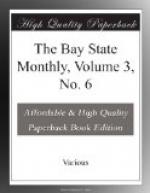Its owner turned upon his clumsy companion in a rage. But before he could speak the guns of the battery blazed out, and in the iron shower that followed there was no thought for anything but that of saving themselves as much as possible.
Round shot would have danced over the water and left them comparatively safe; but in the deadly hail of langrage such escape was impossible. Every moment of it inflicted torturing wounds or death. The boats were beeched with all speed at the foot of the monster which belched forth this red hot torrent wounding wherever it fell. But they had been thrown into confusion, and while some of them struggled to the shore, the occupants of others in their terror drew back out of harm’s way, and left their comrades to their fate. Edmonson’s was not the only flintlock wet, as the soldiers, weary and dispirited, toiled up from the surf. They tried their scaling ladders, they fought for a time with that desperate courage which never forsook them. Their captain cheered them with his bravest words and deeds, and Archdale and Edmonson were foremost in every post of danger until one fell badly wounded.
But from the first the expedition was doomed. After an hour’s conflict the recall was sounded, and the remnant of the scaling party straggled and staggered to their boats, some carrying wounded comrades, some themselves wounded and faint. But many had been taken prisoners by the French, and many lay dead and dying. Elizabeth stood waiting for the wounded to be brought in, and for the roll of the dead. The first man who came walking steadily toward her, turning about at every few steps to see that the men behind him were carrying their burden on their stretchers carefully, was Archdale.
“You?” she said wonderingly. “I thought—I was afraid—.”
“Yes, I have come back,” he answered; “and it is through your warning. Such as my life is, you have saved it.”
[TO BE CONTINUED.]
[Footnote 5: Copyright, 1884, by Frances C. Sparhawk.]
* * * * *
EDITOR’S TABLE.
It is surprising how few people, comparatively speaking, are aware of the fact, that the history of Boston has been treated as the history of no other city in this country has been. The year 1880 was the two hundred and fiftieth anniversary of its founding, and, commemorative of that year, a work, in four beautiful quarto volumes, has been issued in this city by Messrs. Ticknor and Company. The object of this work, and the importance attached to it is what leads us to speak of it in this place and at this time. This object is primarily to present the leading historical phases of the town’s and city’s life and developement, together with the traces of previous occupation, and the natural history of the locality. To accomplish this almost herculean task, the sections were assigned to writers well-known in their respective




